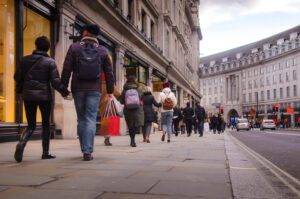
Retailers in London’s West End have suffered a £220 million loss in unrealised sales in the first half of 2024, following the UK government’s decision to scrap tax-free shopping for overseas visitors, according to new research by the New West End Company.
Despite an increase in international visitors, the area’s retailers are expected to face a larger financial hit this year than the estimated £400 million loss in 2023.
The previous Conservative government eliminated tax-free shopping under plans by Jeremy Hunt, the then-chancellor, as part of efforts to shore up public finances. Retailers argue that the policy puts Britain at a competitive disadvantage compared to the European Union, where tourists can receive VAT refunds on purchases over a certain threshold.
Dee Corsi, Chief Executive of the New West End Company, highlighted the broader implications of the so-called “tourist tax,” noting its detrimental effects on the entire tourism ecosystem. “The loss of £400 million in unrealised sales last year in the West End alone is just a small part of this story. Fewer sales on the shop floor means fewer tourists in restaurants and hotels,” Corsi said. “If the government is serious about returning the country to growth, tax-free shopping presents a rare, golden opportunity to do so.”
These figures emerge as Chancellor Rachel Reeves prepares her first budget at the end of October. Reeves has cautioned that tough decisions on tax rises and spending cuts are necessary to address the public finances, and Labour has stated it will not reinstate tax-free shopping for tourists. The party is focused on raising revenues without increasing income tax, VAT, or national insurance.
The New West End Company, which represents 600 retailers, hotels, and restaurants in popular shopping areas such as Bond Street, Oxford Street, Regent Street, and Mayfair, calculates the unrealised losses by comparing passenger arrivals at London’s airports with payment data for international transactions in the West End. These estimates are benchmarked against 2019 figures, when tax-free shopping was still available, and £500 million in discounts were processed, according to the Office for Budget Responsibility.
While overall visitor numbers to London have risen by 3% in the first half of 2024 compared to the same period in 2019, spending has dropped by 12%. This contrasts sharply with a 36% increase in overseas spending across the European Union, highlighting the competitive disadvantage faced by UK retailers.
The New West End Company is urging the government to reinstate tax-free shopping, arguing that it would level the playing field for British businesses against their European counterparts. “The removal of tax-free shopping is not just about lost retail sales; it has a cascading effect on the entire tourism and hospitality sectors,” the association said. “Reinstating the policy would provide a vital boost to the UK economy at a time when growth is urgently needed.”
As pressure mounts on the government to reconsider its stance, the impact of the tourist tax on London’s retail sector underscores the challenges faced by businesses trying to attract international spending in a post-Brexit, post-pandemic landscape. Without policy changes, the UK’s position as a top destination for shopping and tourism could continue to decline, with significant economic repercussions for the capital and beyond.
Read more:
London retailers count cost of ‘tourist tax’ as sales fall by £220m




